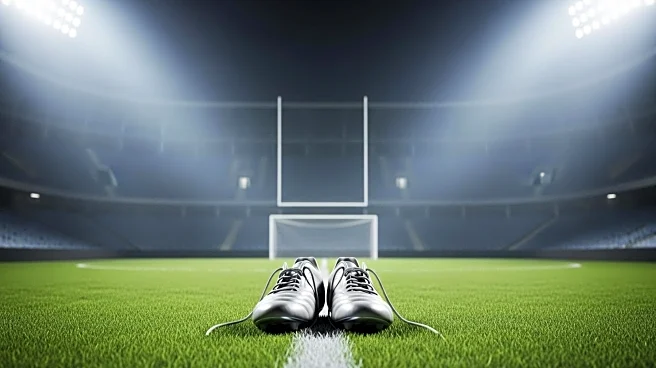What's Happening?
Billy Vigar, a former Arsenal youth player, has died at the age of 21 after sustaining a significant brain injury during a soccer match in England. Vigar was playing for Chichester City, a non-league team, when he was injured in a game against Wingate & Finchley FC. The injury occurred when Vigar collided with a wall at the side of the field, leading to him being placed in an induced coma. Despite undergoing surgery on Tuesday to aid recovery, Vigar passed away on Thursday morning. His family expressed their devastation, noting that the injury occurred while he was playing the sport he loved. Vigar had joined Arsenal's academy in 2017 and signed as a professional in 2022, also playing on loan for Derby.
Why It's Important?
The tragic death of Billy Vigar highlights the risks associated with contact sports, particularly soccer, where players can sustain serious injuries. This incident may prompt discussions on player safety and the need for improved protective measures in lower-league games. The English Football Association and Arsenal have expressed their condolences, underscoring the impact of Vigar's death on the soccer community. The event has led to the postponement of Chichester's scheduled game against Lewes, and a minute of silence will be observed before all matches in the semi-professional league this weekend. This tragedy serves as a reminder of the importance of safety protocols in sports.
What's Next?
In response to Vigar's death, the semi-professional league has announced that all players will wear black armbands during matches this weekend. This gesture is part of the league's efforts to honor Vigar's memory and raise awareness about player safety. The incident may lead to further scrutiny of safety standards in non-league soccer, potentially resulting in changes to regulations or infrastructure to prevent similar accidents. Stakeholders in the soccer community, including clubs and governing bodies, may engage in discussions to enhance safety measures and support for injured players.
Beyond the Headlines
Vigar's death may spark broader conversations about the ethical responsibilities of sports organizations to protect their players. The incident could lead to increased advocacy for better medical facilities and emergency response protocols at lower-league games. Additionally, it may influence cultural perceptions of soccer as a high-risk sport, prompting parents and young athletes to reconsider participation. Long-term, this tragedy could drive changes in how soccer is played and managed at the grassroots level, emphasizing player welfare and safety.










